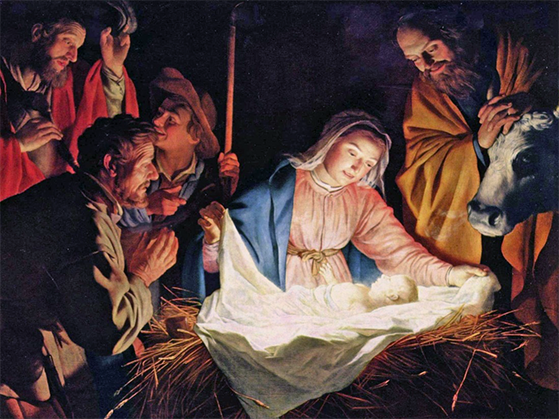
December 2020- January 2021
Passing the Faith
------------------
|





From the Loftiest to the Lowliest
By Paul V. Harrison
Louis XIV was born at 11:20 AM, September 5, 1638, to Anne of Austria, Queen of France, and her husband, King Louis XIII. After two decades of childless marriage, Anne’s pregnancy was celebrated far and wide. Historian John Wolf wrote that as the news of the boy’s birth spread, “the rattle of muskets, the booming of cannons, the ringing of church bells, the chanting of Te Deums, the offering of masses in thanksgiving, the bonfires and fireworks, the singing, drinking, and dancing in the streets with free wine for the people, all testified to the joy and excitement of the kingdom.”
It has often been with royalty that pomp and circumstance attend them, but when the Apostle Paul wanted to impress us with an illustration of humility, he pointed to a different kind of king—King Jesus. He wrote: “Let this mind be in you, which was also in Christ Jesus: Who, being in the form of God, thought it not robbery to be equal with God: But made himself of no reputation, and took upon him the form of a servant” (Philippians 2:5–7), literally “made Himself nothing.”
He could not have been greater: He was “in very nature God.” One could not become lowlier: He “made himself nothing.” The loftiest became the lowliest. And note the wording: this lowliness of Christ didn’t just happen. He “made himself nothing.” This was his intention, His plan, a most unusual plan for royalty.
This lowliness was especially in evidence at Jesus’ birth. Joseph and Mary, an obscure and poor couple, were not people of position and authority. Jewish blood flowed in their veins, and Jews lived under the heel of the Roman government. In the eyes of the world, to the little extent they were noticed at all, Mary and Joseph were “little” people. God knew them. Almost no one else did. Yet they were selected to play the role of Jesus’ parents.
The location of Jesus’ birth wasn’t much to speak of. About six miles south and a bit west of Jerusalem, Bethlehem was no capital city or thriving metropolis. The prophet Micah referred to it as “small among the clans of Judah” (Micah 5:2). Some scholars have estimated its population at a few hundred, so we rightly sing “O Little Town of Bethlehem.”
If the city of Jesus’ birth is surprising, the specific place is even more so. Luke 2:7 states: “she brought forth her firstborn son, and wrapped him in swaddling clothes, and laid him in a manger; because there was no room for them in the inn.” Some city folk need to be educated a bit on mangers. A manger is an animal’s feeding trough. This, of course, means little Jesus was born in a stall, a place for livestock, and instead of being laid in a clean bassinet, he rested where sheep and goats and the like found and ate their food.
We should also note the first recorded visitors to the makeshift delivery room were shepherds. Not kings or princes. Not doctors or people of influence, but men who slept outdoors and watched sheep. In that day, those who tended animals were so low in social status they were not allowed to testify in legal proceedings. If the announcement of Jesus’ birth had come to them in written form, in all likelihood, they would not have been able to read it. Not only were shepherds low in social status, but they were low in moral standing as well. The great scholar Joachim Jeremias noted that buying wool, milk, or a kid from a shepherd was forbidden on the assumption that it was stolen property. In summary, lowly parents traveled to a lowly place where their little baby was born, and the rejects of society came to visit him.
Finally, we should recall that when these early weeks of Jesus’ life passed, Mary and Joseph took him to their home in Nazareth. Again, this Galilean city offered little. Someone once asked, “Can anything good come out of Nazareth?” So insignificant a community it wasn’t mentioned in either the Old Testament or in the writings of Josephus. Yet, Nazareth became Jesus’ childhood “stomping ground.” He sometimes took a trip to the big city, but He surely didn’t live in one.
Christmas reminds us that God loves contrast. He loves to take a trickle of water and stretch it into Niagara Falls. He likes to take sky and sun and mix in some clouds and produce a sunset no human artist could duplicate. Oh, what a contrast on that first Noel! The Almighty took an “ordinary” birth and transformed it into the birth of all births, the birth of God Himself. He took a dark world and into it introduced a seemingly small light, a baby light that, in a few short years grew to illuminate all of creation, and still shines brightly today.
God would love to make a contrast of you.
He would love to take your darkness and replace it with a flame to point others to Himself, the Light of the World.
About the Writer: Dr. Paul V. Harrison has pastored Madison FWB Church (AL) since 2015. He is creator of the Classic Sermon Index: www.classicsermonindex.com.
|
|

